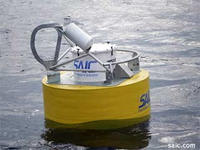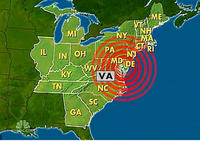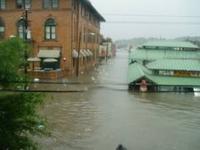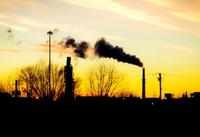-
Drones being used to track hurricanes

Federal hurricane trackers will start experimenting with unmanned boats and aircrafts to learn more about how to anticipate and track the movements of hurricanes; NASAand the National Oceanic and Atmospheric Administration(NOAA) are teaming up and using a pair of military-surplus Global Hawk spy drones, which are known more for spying on battlefields than chasing storms
-
-
Underground organisms play a more complex role carbon capturing than previously thought
In a surprising finding, researchers have shown that certain underground organisms thought to promote chemical interactions that make the soil a carbon sink actually play a more complex, dual role when atmospheric carbon levels rise
-
-
Evaluating fresh water sustainability in the southern U.S.
Researchers have embarked on 4-year federal research effort to evaluate freshwater sustainability across the southern United States and develop policy recommendations on what can be done to make the best use of water supplies in the face of population growth and the effects of climate change over the next ten to thirty years
-
-
Hurricane Isaac downgraded from Category 1 hurricane to tropical storm

Hurricane Isaac was downgraded from a category 1 hurricane to a tropical storm. The storms winds have dropped below 70 mph, but the storm is moving very slowly throughout the gulf area at about 6 mph; at this point officials estimate that Isaac is expected to cause $1.5 billion in insured losses
-
-
New Jersey infrastructure badly needs shoring up, and soon
According to experts, changes to the way New Jersey maintains its infrastructure must be made soon, or the state could be vulnerable to catastrophic failures in its water and power systems as well as collapsing roads; the North Jersey Transportation Planning Authority says more than $56.9 billion will be needed just to maintain state roads, rails, and public transportation systems through 2035; when you add in improvements to account for environmental changes and the expanding population in the state, the bill skyrockets to more than $123 billion
-
-
The costs, benefits, and efficiency of aviation security measures
The threat of terrorist attack on American aviation has made the system the focus of intense security efforts, but it is difficult to determine if the benefits outweigh their cost; efficient security policy — a focus on getting the most security for the least cost — should be the priority in an era of fiscal austerity, says a new RAND report
-
-
New filter will help clean oil spills
Oil and water disdain each other, but once forced to comingle they are nearly impossible to separate; a new filter separates oil and water using only gravity; the filter could help clean oil spills, or clean water at treatment plants
-
-
Japan awards tsunami buoy contract to SAIC

The Japan Meteorological Agency (JMA) in Tokyo, Japan, has awarded (SAIC) a contract for the production and delivery of six SAIC Tsunami Buoy (STB) systems; the STB systems will be deployed at locations in the northwest Pacific Ocean approximately 200 nautical miles east of Sendai, Japan
-
-
Heat waves move toward California coasts, become more humid, imperiling health
Scientists detected a trend toward more humid heat waves which are expressed very strongly in elevated nighttime temperatures, a trend consistent with climate change projections; moreover, relative to local warming, the mid-summer heat waves are getting stronger in generally cooler coastal areas; this carries strong public health implications for the twenty-one million Californians living near the ocean whose everyday lives are acclimated to moderate temperatures
-
-
Last year’s east coast earthquake has the region preparing for another one

Last year an earthquake that was centered in Virginia shook up the entire east coast, surprising everyone; it did not result in any deaths and was considered relatively light compared to many tremors on the West Coast, but it was bad enough to force some states to prepare themselves in case of another quake
-
-
Activists in arms over plans to ship plutonium to New Mexico
A proposal to ship tons of plutonium to New Mexico, including cores of nuclear warheads which would be dismantled at a structurally questionable lab on top of an earthquake fault zone, has activists and nuclear watchdogs up in arms
-
-
Tampa Bay’s infrastructure receives C grade – some say it is a gentleman’s C

All eyes are Tamp Bay as it anxiously awaits the full brunt of tropical storm Isaac; long-time residents of the city and the neighboring counties will not be happy to learn that the city has been given a C grade for its infrastructure; engineer Kathy Caldwell, past president of the American Society of Civil Engineers, who teaches at the University of Florida, said: “None of us would expect our children to come home with the reports cards that we gave the region’s infrastructure”
-
-
Crowdsourcing for quake-monitoring
Technology is creating a new breed of scientist — citizen scientists – ordinary people and volunteers from all walks of life coming together to help monitor, and possibly mitigate, the next big earthquake through an innovative program called NetQuakes
-
-
Cooling coal emissions would clean air, lower health, climate-change costs

In the United States there are about 1,400 electric-generating unit powered by coal, operated at about 600 power plants; the estimated health costs of burning coal in the United States are in the range of $150 billion to $380 billion, including 18,000-46,000 premature deaths, 540,000 asthma attacks, 13,000 emergency room visits, and two million missed work or school days each year; scientists estimate that implementing large-scale cryogenic systems into coal-fired plants would reduce overall costs to society by 38 percent through the sharp reduction of associated health-care and climate-change costs
-
-
Maldives to build floating islands to save country from rising sea levels
The Maldives Islands, a low-lying chain of twenty-six atolls in the Indian Ocean, are sinking; more precisely: due to global warming, the sea level is rising over the islands, most of which sit lower than three feet above the rising water; the Maldives government has embarked on an ambitious project: build floating islands, anchor them to the ocean floor, then relocate most of the population of 300,000 – and some of the tourist attractions – to them
-
More headlines
The long view
Using Drone Swarms to Fight Forest Fires
Forest fires are becoming increasingly catastrophic across the world, accelerated by climate change. Researchers are using multiple swarms of drones to tackle natural disasters like forest fires.
How Climate Change Will Affect Conflict and U.S. Military Operations
“People talk about climate change as a threat multiplier,” said Karen Sudkamp, an associate director of the Infrastructure, Immigration, and Security Operations Program within the RAND Homeland Security Research Division. “But at what point do we need to start talking about the threat multiplier actually becoming a significant threat all its own?”
